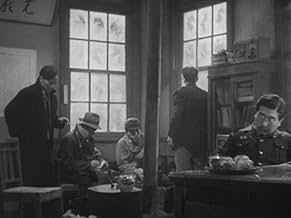Three bank robbers on the run from the police hide out in a remote mountain lodge high up in the snowy Japanese Alps.Three bank robbers on the run from the police hide out in a remote mountain lodge high up in the snowy Japanese Alps.Three bank robbers on the run from the police hide out in a remote mountain lodge high up in the snowy Japanese Alps.
- Director
- Writers
- All cast & crew
- Production, box office & more at IMDbPro
Storyline
Did you know
- TriviaThis was the first feature for both actor Toshirô Mifune and composer Akira Ifukube.
- Quotes
Haruko's Grandfather: Don't make a fuss about it. The mighty mountain will punish the bad.
- ConnectionsReferenced in Mifune: The Last Samurai (2015)
- SoundtracksOh! Susanna
(uncredited)
Written by Stephen Foster
[The song played on the record player to which Haruko asks Honda to dance]
Featured review
This peculiar romantic crime drama would probably be hailed as a classic if it were widely seen today, although it's not that tremendous; still, it's a deliberately unusual piece of work, and a generally neglected piece of Akira Kurosawa's filmography (as indeed are the majority of those pictures he wrote but did not direct, an alarming number of which have never even been shown outside Japan). It marks the formal debuts of Senkichi Taniguchi as director and Akira Ifukube as composer, but in the long run it's very much more a Kurosawa movie, shot through with his accustomed humanity, and full of surprises. Especially interesting is the way Takashi Shimura's criminal character develops, starting out proudly savage and then against all odds becoming a tender person, who ultimately cannot bear to kill the man who is loved by the woman HE'S in love with ... because he can't stand the idea of hurting her. Toshiro Mifune's character, by contrast, seems redeemable at the start but grows increasingly evil -- not at all what the filmmakers suggested at the start, and not at all expected. The film also boasts an astonishingly restrained performance by Yoshio Kosugi, who rarely met a piece of scenery he didn't like to gnaw upon, but who is remarkable here. Setsuko Wakayama and Kokuten Kodo are also superb; this is probably one of the only pictures that gave Wakayama a chance to shine, as for whatever reason she never became a major star in Japan.
The snowbound location photography is excellent (much of the picture was drawn upon director Senkichi Taniguchi's own considerable experience as a mountain climber), and while Akira Ifukube's score is almost too energetic for its own good -- he clearly thought that his first time out he ought to be scoring every different scene with a separate leitmotif, and GODZILLA fans might be amazed to hear his first version of the famous "underwater ballet" music from that original 1954 film already in here (more conservative viewers who avoid monster movies might have also happened to hear the identical music in THE BURMESE HARP) -- Ifukube underlines the drama beautifully, and in the lengthy sequences that are without dialogue, he tells us most eloquently what the characters are feeling. When the elegy kicks in under Shimura's reappearance over the cliff, it's a heartbreaker. And yet there's hardly any music at all in the first hour, unusual for a film of any type at the time.
It's not quite a masterpiece, but THE END OF THE SILVER MOUNTAINS is essential viewing for anyone who cares about Kurosawa, Mifune, Shimura, Ifukube, or indeed everyone who worked on this movie, and very clearly cared about it a lot.
The snowbound location photography is excellent (much of the picture was drawn upon director Senkichi Taniguchi's own considerable experience as a mountain climber), and while Akira Ifukube's score is almost too energetic for its own good -- he clearly thought that his first time out he ought to be scoring every different scene with a separate leitmotif, and GODZILLA fans might be amazed to hear his first version of the famous "underwater ballet" music from that original 1954 film already in here (more conservative viewers who avoid monster movies might have also happened to hear the identical music in THE BURMESE HARP) -- Ifukube underlines the drama beautifully, and in the lengthy sequences that are without dialogue, he tells us most eloquently what the characters are feeling. When the elegy kicks in under Shimura's reappearance over the cliff, it's a heartbreaker. And yet there's hardly any music at all in the first hour, unusual for a film of any type at the time.
It's not quite a masterpiece, but THE END OF THE SILVER MOUNTAINS is essential viewing for anyone who cares about Kurosawa, Mifune, Shimura, Ifukube, or indeed everyone who worked on this movie, and very clearly cared about it a lot.
- How long is Snow Trail?Powered by Alexa
Details
- Release date
- Country of origin
- Languages
- Also known as
- По ту сторону Серебряного хребта
- Filming locations
- Production company
- See more company credits at IMDbPro
- Runtime1 hour 29 minutes
- Color
- Sound mix
- Aspect ratio
- 1.37 : 1
Contribute to this page
Suggest an edit or add missing content

























